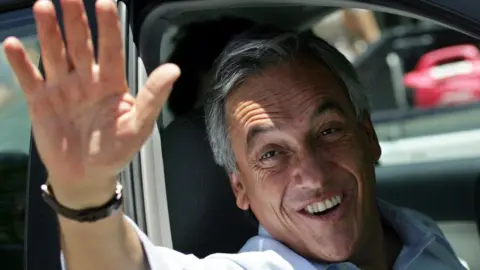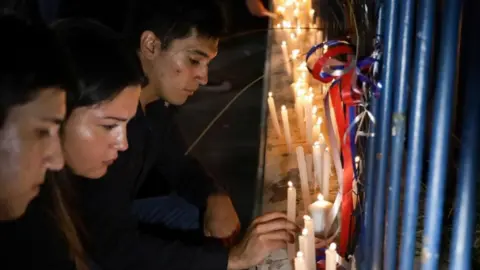Sebastián Piñera: Chile ex-president drowns after his helicopter crashes in lake
Chilean ex-President Sebastián Piñera, who served two terms and was also a billionaire businessman, has died in a helicopter crash at the age of 74.
Three other people aboard the aircraft survived when it came down in a lake near the southern town of Lago Ranco.
A post-mortem carried out on Piñera's body, which had earlier been found next to the submerged helicopter, showed he had drowned.
National mourning has been declared and tributes have poured in.
Piñera was spending his holidays with his family in the lakeside resort of Bahía Coique, 920km (570 miles) south of the capital, Santiago.
The ex-president often used his private helicopter to travel around the area and officials have confirmed he was piloting it when it crashed on Tuesday.
Aviation expert Eddie Miceli told CNN that the former president was "an excellent pilot".
Piñera had reportedly had lunch with his friend, businessman José Cox, on the southern shore of Lake Ranco and was heading back to the northern shore when his helicopter ran into problems.
It was raining at the time and there was considerable cloud but an investigation is under way to establish what exactly caused the helicopter to go down just minutes after taking off.
 EPA
EPAIt crashed into the lake with him still on board. The other three passengers - his sister Magdalena, a friend and the friend's son - survived.
According to reports in local media, the three survivors jumped from the helicopter and managed to make it ashore safely.
Footage showed Magdalena Piñera walking out of a health centre where she had been taken after the accident. She told the journalists assembled there that her brother "was a great man, a generous and courageous man".
His body will be flown to the capital, Santiago, where a state funeral will be held on Friday.
Piñera came to power in 2010, the first conservative politician to be elected president after the end of military rule 20 years earlier.
Born in 1949, the canny businessman made much of his money in the 1980s when he introduced credit cards to Chile through his company Bancard.
The Harvard-trained economist and one of Chile's richest men displaced the country's first female President Michelle Bachelet, promising to turn his business acumen to the country's economy.
He was credited with rapid economic growth during his first term from 2010 to 2014.
Internationally, he was perhaps best known for overseeing the spectacular rescue of 33 miners trapped for 69 days beneath the Atacama Desert in 2010, a story which gripped the world.
Some of the rescued miners have been paying tribute to the ex-leader. Mario Sepúlveda told CNN that he was "sad, very sad". He praised Piñera for the way he had comforted the miners' relatives when the 33 were trapped underground.
However, his second term, from 2018 until last year, was marred by violent social unrest.
Mass demonstrations against inequality swept through the country and were met with harsh repression from the security forces.
While Piñera declared a state of emergency and said the country was "at war", he later acknowledged that there had been an "excessive use of force".
He was succeeded in office in 2022 by Gabriel Boric, a left-wing former student leader who played a leading role in the demonstrations during Piñera's first term in office.
Even though they held opposing political views, President Boric paid a warm tribute to his predecessor on Tuesday.
"We are all Chile and we should dream it, draw it and build it together," he said. "Sebastián Piñera said this when he assumed his second presidential term on 11 March 2018. We send a big hug to his family and loved ones in these hard times."
 EPA
EPAOther left-wing leaders also praised the former president.
"We got along, we worked to strengthen the relationship between our countries and we always had a good dialogue, when we were both presidents, and also when we weren't," Brazil's President Luiz Inácio Lula da Silva wrote on X.
Argentina's former conservative President Mauricio Macri said Piñera's death was an "irreplaceable loss" and he felt "immense sadness" while Iván Duque, the former conservative president of Colombia, said he felt great sadness over the death of his friend.
